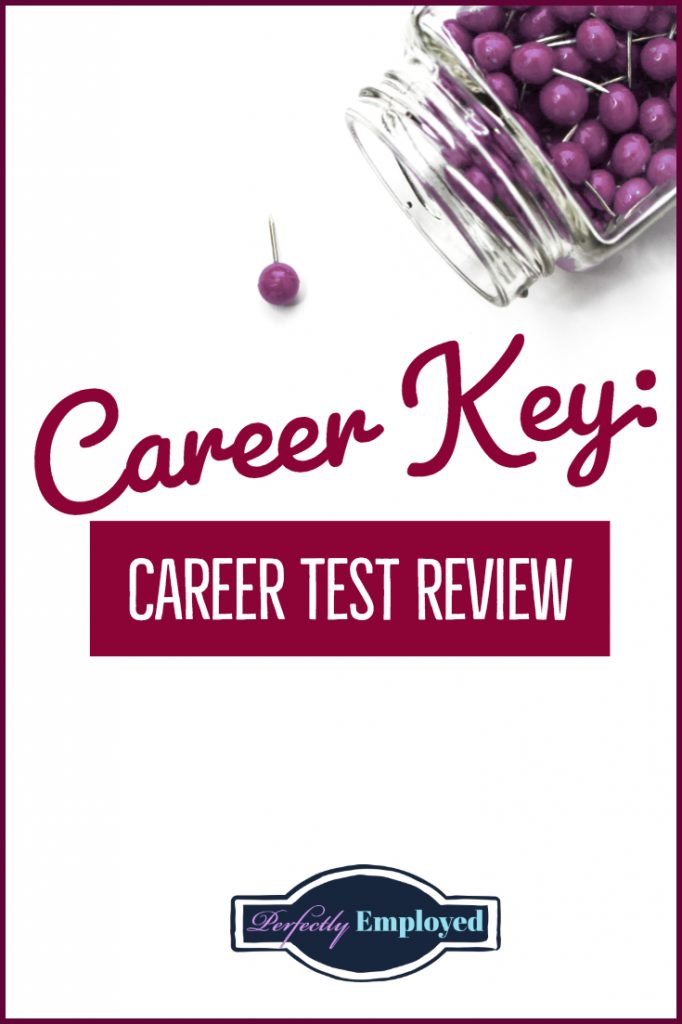
If you aren’t sure what you want to do with your life, career tests are a great way to get ideas. This week, we tried Career Key, and while it’s a good tool, it might not be the right career test for everyone. Our Career Key review walks through the entire experience so you can decide for yourself whether it can help you.
Getting Started with Career Key
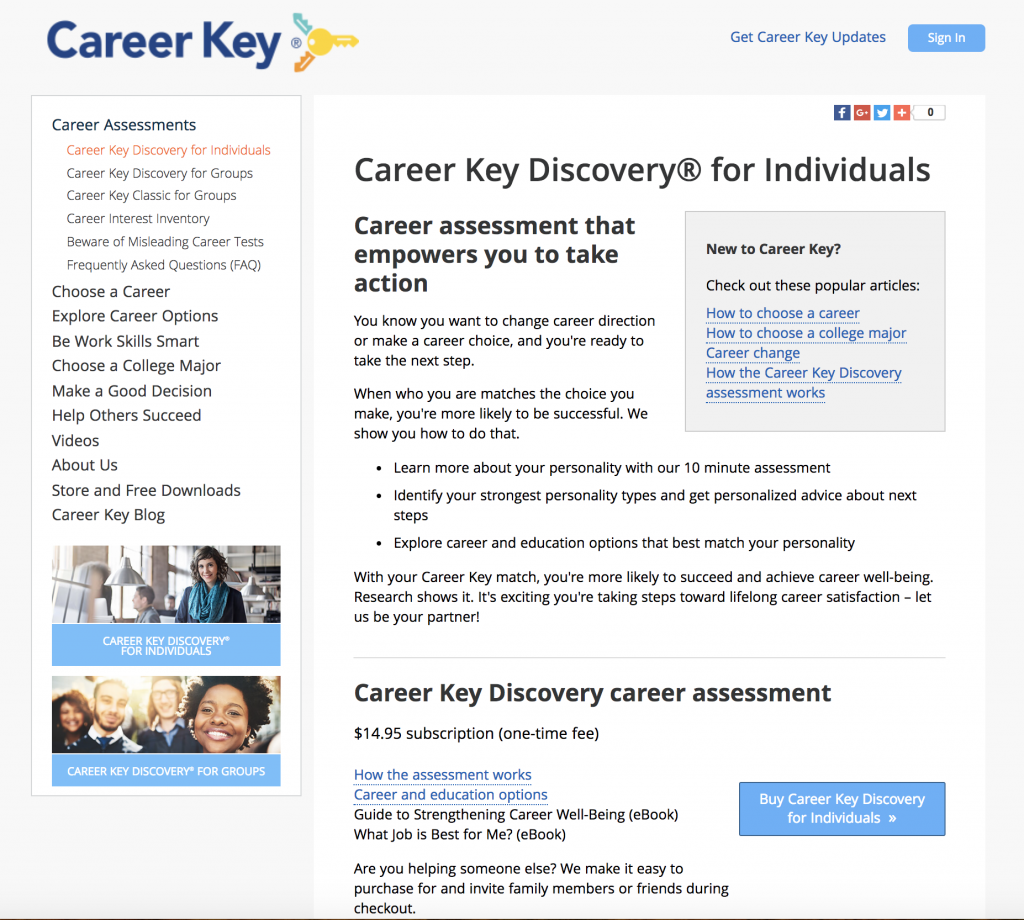
Career Key is a career test that evaluates your personality and abilities and allows you to explore careers that fit your personality. The website claims that the test is used by schools and corporations all over the world. It’s listed on What Color is Your Parachute? author Dick Bolles’ list of career tests, so we certainly thought it was worth $14.98 to try it.
The link to take the assessment is about halfway down the Career Key home page, so it’s not in the most obvious place possible, but I found it without too much effort. The sign up form allowed me to link a Google account, but still required me to enter all of my mailing address information. It’s everything you expect in a sign up form—name, address, email, billing address, credit card info.
The sign up form does have one surprise, though: It asks where I am in my “Discovery Stage.” Obviously, I’m “working,” but it’s clear that the Career Fitter test is suitable for even the earliest stages of figuring out what you want to be when you grow up. It’s even recommended for middle school students!

Career Key’s Personality Assessment
Career Key has six assessment sections in their personality test, each with six questions or less. They advertise that you can complete the test in about 10 minutes. It took me about 7-8 minutes to complete, even with taking screenshots for this review.
The first section asks six questions about the things you like to do. You decide if you like to work with animals, solve math problems, or pursue creative activities. You don’t have to choose just one; instead, you rank how true it is that you like to work with each activity.
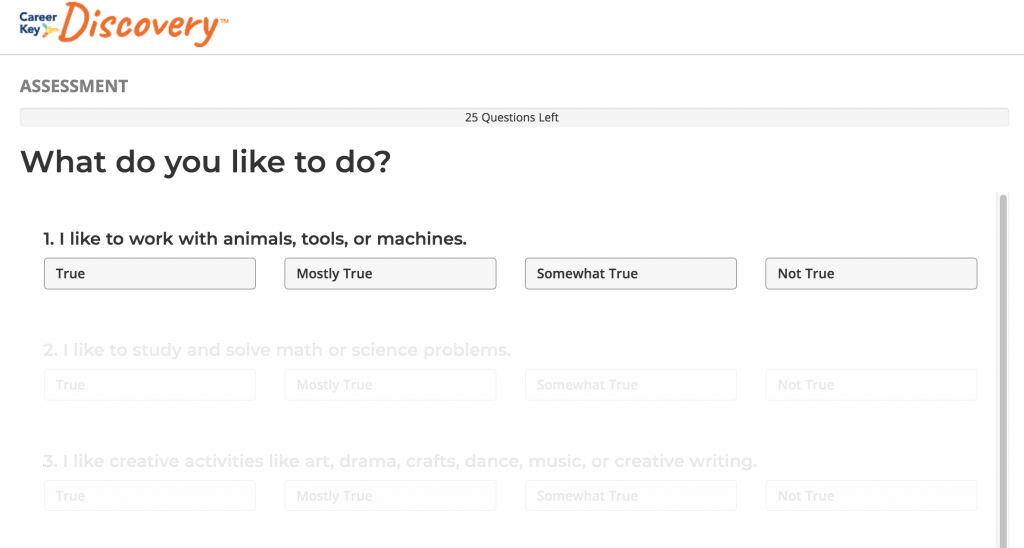
The second part of the assessment looks at your abilities—or rather, what you think your abilities are. The questions are similar to the first part of the assessment, only instead of asking what you like to do, the test is asking if you have “good skills in working with” the same activities.

The third part of the assessment gives you a list of jobs and asks you to select the ones that most interest you. You can select as many or as few as you wish.
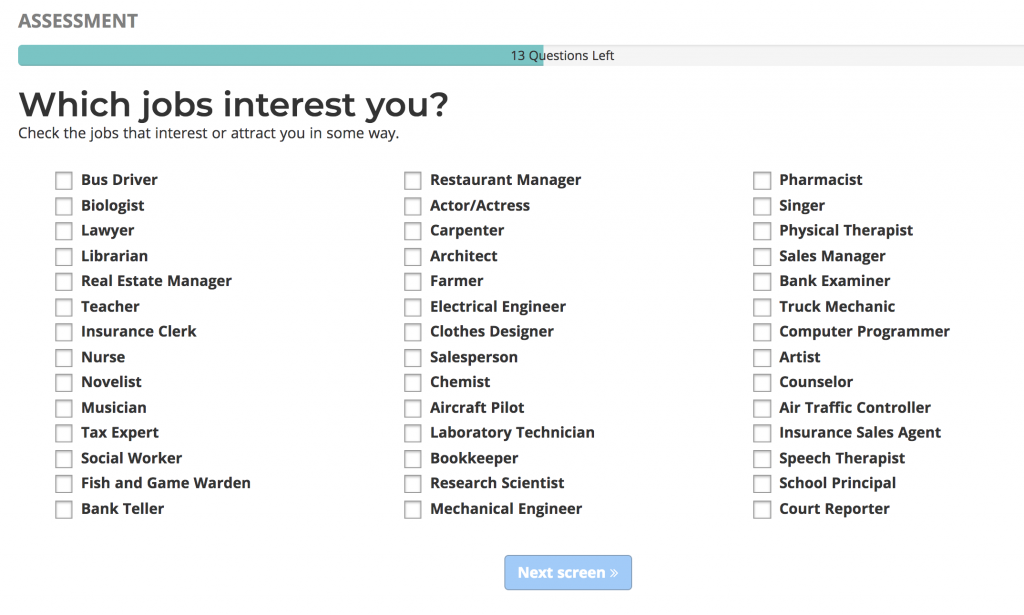
The fourth part of the assessment asks you how interested you are in each job you selected in the last part of the assessment.
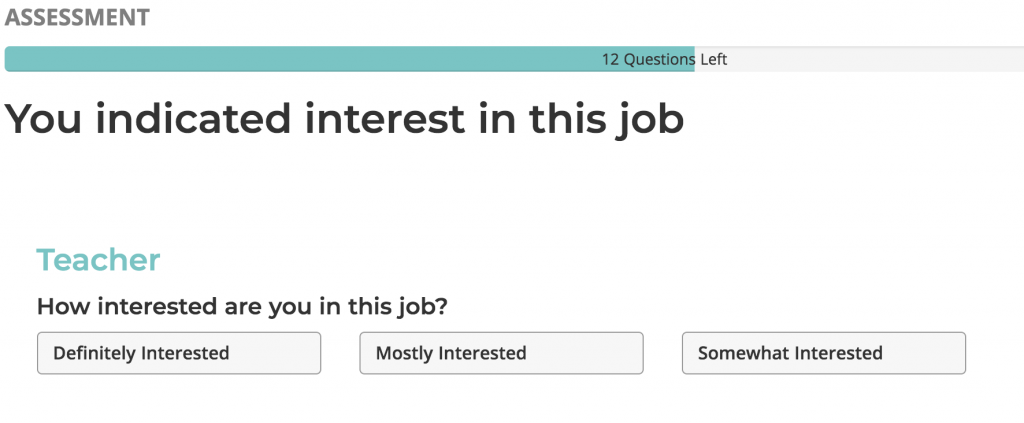
The fifth part of the assessment asks how you see yourself. Are you practical? Creative? Some of both? Once again, you rank each personality component based on how true they are for you.

Finally, the assessment asks about your values. The questions aren’t the strong moral questions we expected, but values based on the activities we’ve been ranking throughout the assessment. Again, do you value animals and mechanical stuff? Or do you value creativity?

Personality Results
The assessment then produces a report about your personality. For those of you who read this blog regularly, you probably already know that I am an INTJ who is more introverted than 98% of the population. I am a writer, a teacher, and an instructional designer, but I’m not a salesman. So, imagine my surprise when these were my results from the Career Key test:
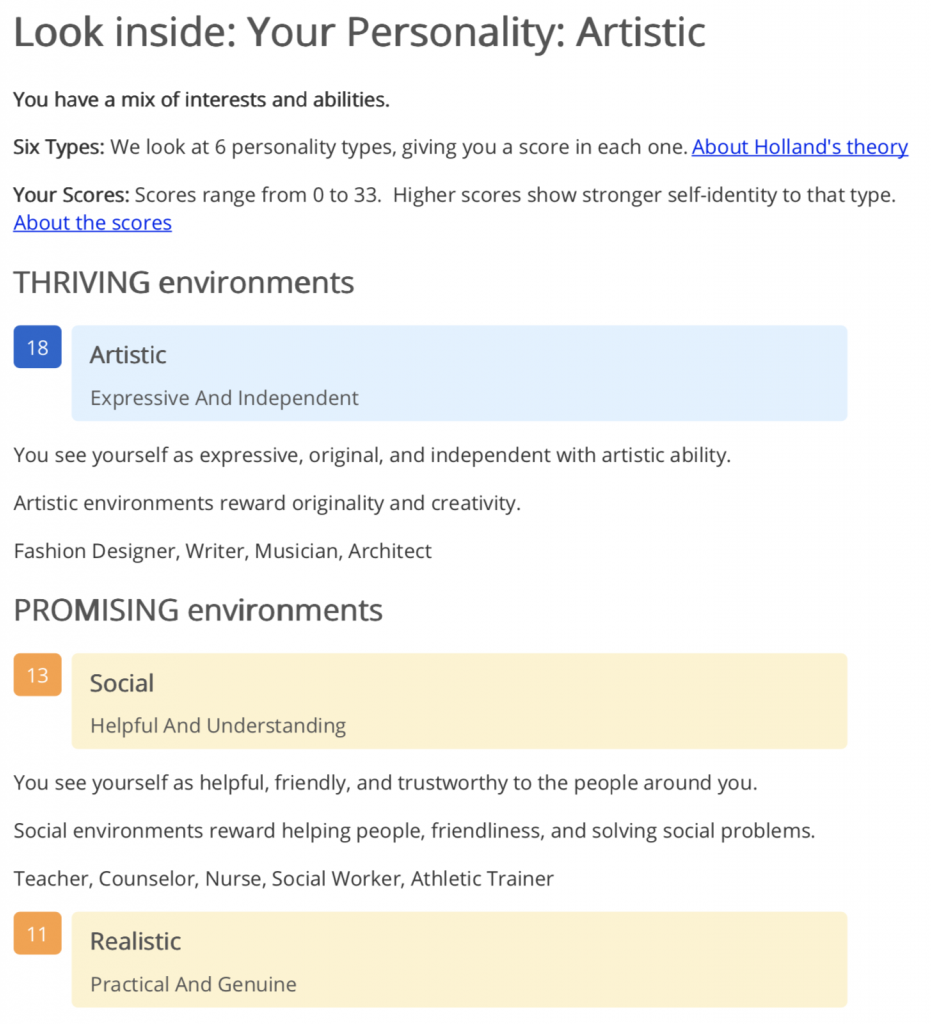
That’s right—me, who would rather send an email and wait a week on a response than pick up the phone and get an answer immediately—gets “social” as a “promising environment.” The recommended jobs include social worker, nurse, and athletic trainer! I’m starting to wonder if my evil twin took this test for me…
The problem comes in with the personality explanation: Personalities are ranked from 0-33 based on your assessment answers. Well, if you look back at my results, I didn’t score anywhere close to a 33 in any of the suggested environments. I’m not strong enough in any one area for the test to give an accurate output, so the best it can see is that I am sorta artistic, and sorta social and realistic.
As an INTJ, I know very little of that is true. This doesn’t mean your test won’t be more accurate than mine. I’m probably a bad test subject for this particular assessment.
Pick Your Own Careers and Finish the Career Key Profile
After the personality assessment, Career Key gives you a big list of careers and majors that you can select and start a list of what interests you. Bookmark the ones you like to complete your profile.
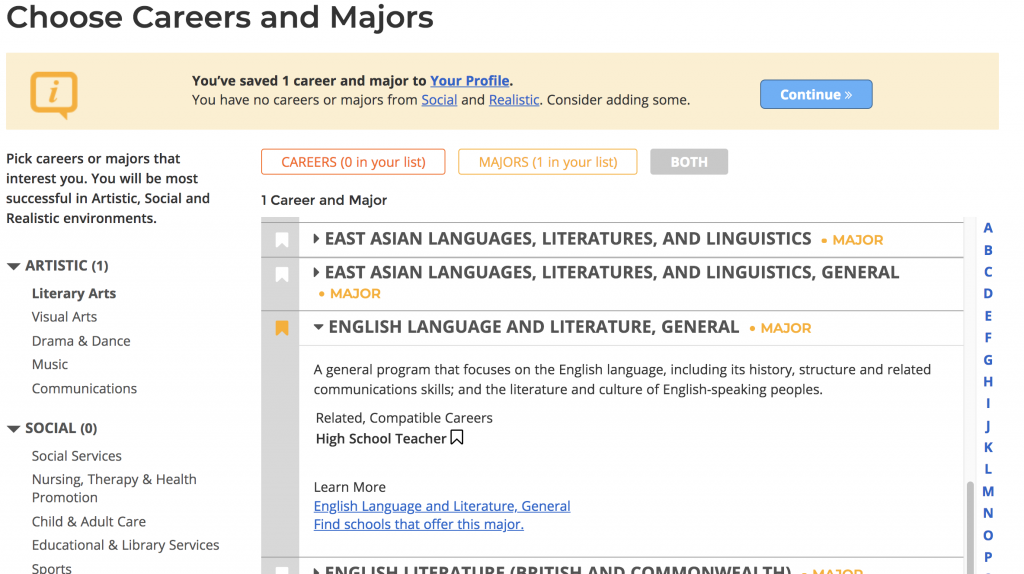
Overall Impressions of Career Key
Career Key has a nice database of potential careers and majors at the end of the assessment. Since the assessment uses Dr. Holland’s theory of career choice,it may not feel like the right “fit” for people in the middle of their careers.
Dr. Holland’s theory relies on generalities, and to be fair, most personality and career tests do. These generalities can help you when you feel “stuck.” Dr. Holland’s theory, though, believes that there are only six personality types. He arranges them in a hexagon, and if you have one personality, the personalities listed beside it on the hexagon are complimentary, so they might work for you too. The personalities that are directly opposite are just that: opposite. So, they probably aren’t a good match for you.
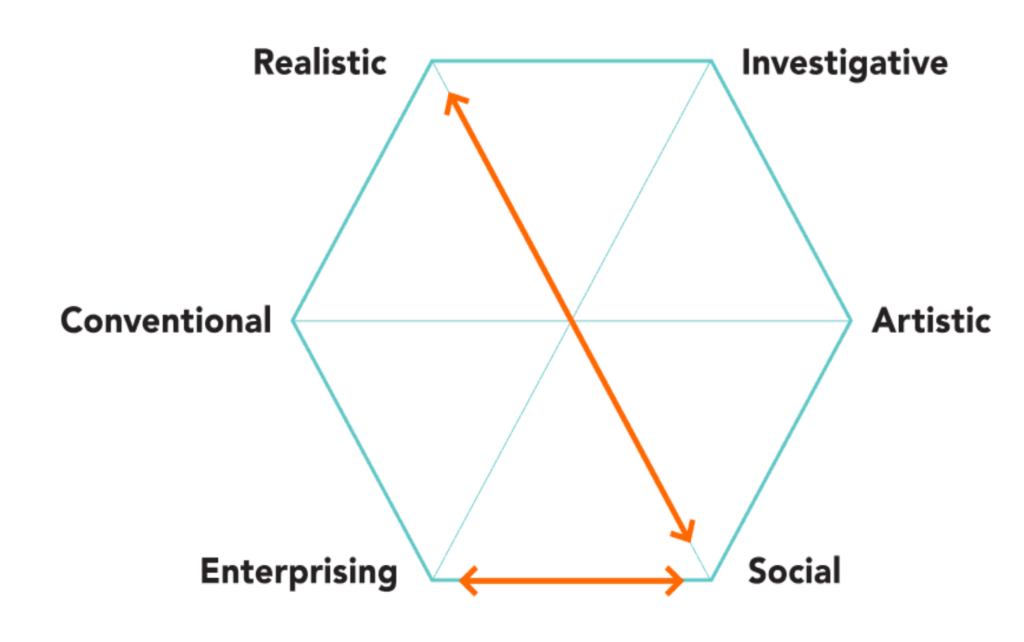
Yet…if you go back to my test results…the two “promising” environments for me are “realistic” and “social”—polar opposites on the Holland Hexagon!
So, I guess that makes me a walking contradiction. In that case, this test might be quite accurate! If you’re interested, here is my full profile report: Katie’s Career Key Profile Report
If you’re at the beginning of your career, or in college and not sure of what major you should choose, Career Key would be very helpful. The list of suggestions it provides is comprehensive, and it is definitely worth $14.98 to try it.
Try Career Key and let us know what you think about it in the comments! I’d love to see your results.


